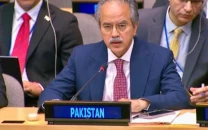‘Evaluation of PTCL assets’ to be completed soon
Etisalat chief discusses outstanding issues with finance minister

The government and Etisalat on Thursday held another round of talks to settle $800m proceeds of the sale of the Pakistan Telecommunication Company Limited (PTCL) outstanding for more than 13 years.
The dispute emerged after the government failed to transfer all properties to the UAE-based firm — as mentioned in the agreement.
Etisalat International Chief Executive Officer (CEO) Hatem Dowidar reaffirmed to have evaluation of the properties completed soon and expressed readiness to further invest in the IT and Telecom sector in Pakistan.
The affirmation was made during his meeting with Federal Minister for Finance and Revenue Shaukat Tarin, said a statement issued by the finance ministry.
During the meeting, both the sides agreed to proceed ahead for the resolution of all outstanding issues between Etisalat and the Privatisation Commission in a spirit of goodwill.
In March 2006, the then government signed an agreement with Etisalat under which 3,384 properties of the PTCL had to be handed over to the company. However, the properties on the ground were only 3,248 while 38 properties could not be transferred.
The dispute between the government of Pakistan and Etisalat had come down to the 33 properties whose titles could not be transferred in the name of PTCL.
Etisalat had offered to pay about $275 million to wind up the lingering matter. Pakistan had previously asked Etisalat to deduct about Rs9 billion out of the total $800 million. After detailed interactions, Etisalat had come up with a final counter offer of no more than $275 million.
Read: Submarine cable fault slows internet across Pakistan
The sale deed required the dispute over properties to be settled through valuation of assets by both sides. In case of difference over valuation, the valuation by Etisalat has the preference under the deed, unless the matter is taken up for arbitration.
The technical services agreement (TSA) of PTCL with Etisalat also did not have a legal life after it expired in 2011 and revised up to 2014.
The PTCL’s asset management department had originally provided inaccurate and fundamentally flawed records on its properties as it owned only 3,248 properties but had mentioned 3,384 in the privatisation agreement finalised in 2006.
The government, which still had 62 per cent stake in PTCL, has now provided the list of all 3,248 properties to Etisalat with details while the remaining 33 properties could not be transferred to PTCL. Etisalat had made upfront payments of $1.4bn in a couple of installments but then stopped the remaining amount of $800 million on the premise of non-transfer of all properties in the name of PTCL.
According to Etisalat, the number of non-doable properties was not 33 but 363 based on the list provided by the asset management department of the PTCL as part of sale-purchase agreement. The properties could not be transferred in the name of PTCL because they were either partially owned, rented out, owned by provinces but occupied by the federal government, or were not owned by the PTCL in the first place.
Earlier, the finance minister underscored the significance of resolving outstanding issues between Etisalat and the Privatisation Commission and moving ahead for a sustainable solution. He emphasised fair evaluation of properties at the earliest, the statement added.
Tarin also highlighted prospects of foreign investment in Pakistan especially in IT and Telecom sector which is growing rapidly, adding that the government was providing conducive environment and incentives to attract foreign investment.
He said the United Arab Emirates (UAE) was one of the major economic partners of Pakistan and his country attached great value to the brotherly relations with the UAE and intends to further strengthen business and trade linkages between the two countries.
Among others, the meeting was attended by Federal Minister for Privatization Muhammadmian Soomro, Chairman Privatization Commission, Secretary Finance and senior officers.



















COMMENTS
Comments are moderated and generally will be posted if they are on-topic and not abusive.
For more information, please see our Comments FAQ